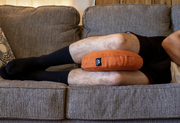If you don’t have anxiety you likely know someone who does. Anxiety is the most common mental health disorder in the United States. It is defined by the American Psychological Association as “an emotion characterized by feelings of tension, worried thoughts, and physical changes like increased blood pressure. People with anxiety disorders usually have recurring intrusive thoughts or concerns. As a result, they may avoid certain situations out of worry”.
These particular situations can be performance-related, such as speaking in public, giving a presentation, or being called on in class. Or, anxiety can be triggered during social situations, which is known as social anxiety. There are also certain situations that can trigger anxiety at home - like bedtime!
Sleep anxiety is when a person feels stressed or fearful about going to sleep. The reason a person feels stressed about sleep can vary. For example, when a person has a phobia about sleep, it is called somniphobia. Individuals with somniphobia are scared that something terrible will happen to them while they are sleeping, so they feel the need to stay awake. In more severe cases, it can cause panic attacks before bed or during sleep. Often these fears are related to dying in one's sleep or sleepwalking.

Alternatively, some people may have anxiety about sleep because of a co-existing sleep disorder. For example, if you have insomnia and become stressed that you aren’t getting the rest you need, you can become anxious about sleep and bedtime. Unfortunately, sleep disorders and mental health disorders often co-exist, which can make it feel like a never-ending cycle.
Sleep anxiety can affect people of all ages. Recent research has revealed that up to 80% of children experience bedtime anxiety. Silentnight, the organization that completed the study, believes there are a few different reasons for this. They found that 20% of children experience nightmares, 20% are scared of sleeping alone, and approximately 25% are afraid of the dark. In addition to night-time scaries, about 14% of children have the daytime stress of bullies that causes them to lose sleep at night. One of the researchers at Silentnight said these daytime anxieties can surface at bedtime when there is nothing else to distract them.
Children need sleep for their development and to function at school the next day. So, when anxiety limits their sleep, it can have lasting consequences. Further, if a child isn’t sleeping enough because of stress, it likely means their parents aren’t getting enough time on their millet pillow or any other perfect sleeping pillow either.
Teens and adults are just as much at risk for sleep anxiety as children, although the causes differ. Research has found that those with insomnia, narcolepsy, sleep apnea, sleepwalking, and restless leg syndrome (RLS) are more likely to develop anxiety. Additionally, those with mental health disorders such as depression, panic disorder, post-traumatic stress disorder (PTSD), schizophrenia, bipolar disorder, and addiction are more likely to develop sleep anxiety.

Anxiety can worsen at night when stress rises. When we are stressed and anxiety is triggered, our body releases a hormone called cortisol. Cortisol is our body's fight or flight response and is intended to help us react quickly. This natural process is meant to keep us safe and out of danger; however, it can be triggered even when no real threat is present. When our stress hormones are chronically high, it can make it difficult for us to fall asleep. And even if we do fall asleep, it can cause us to wake up again in the night and not fall back asleep.
Sleep research has found that high levels of anxiety impact rapid eye movement sleep (REM) specifically. This is when we tend to have our most vivid dreams, which may turn into nightmares if anxiety levels are high. This is why sleep anxiety can feel cyclical. You have anxiety, so sleep becomes stressful, whether that be from trouble sleeping or nightmares. These nightmares and disruptions in sleep reinforce a person’s negative, stressful association with sleep. So, since sleep is so stressful, you become more anxious as bedtime approaches. This is also known as sleep dread. Dreading going to bed, even when you feel tired, can happen when you have a negative association with bedtime.
If this all sounds familiar, you may be suffering from sleep anxiety. When you can’t sleep despite being comfortable on your millet pillow and under your cozy covers, it could be from anxiety. As a result you may experience behavioral changes such as increased nervousness, restlessness, irritability, feelings of overwhelm, inability to concentrate, or a sense of impending doom. Additionally, you may experience physical symptoms before bed, like sweating, muscle tension, increased heart rate, rapid breathing, trembling, or digestive issues.
I think I have sleep anxiety; now what?
Although the thought of having sleep anxiety can cause further stress, there is good news. You can manage anxiety levels and improve your quality of sleep. First, you need to speak with your healthcare provider to receive a diagnosis. They will ask a series of questions and may prescribe a sleep study. During a sleep study, you will be hooked up to a number of wires and computers to monitor your body and sleep (you can read more on our blog post, A Night in a Sleep Lab: What to Expect). Following this, the healthcare provider will conduct an analysis to help determine if it is anxiety disrupting your sleep or something else. For example, if it is discovered you have sleep apnea, your healthcare provider will address this first to see if it remedies your sleep-related stress.

The first step in managing sleep anxiety is through healthy sleep hygiene. Sleep hygiene consists of behaviors and routines before bed that impacts your sleep. Before you make any adjustments, keep a diary of everything you do, eat and drink in a day. Write down when you go to bed each night and when you wake up. You should also note the length of any naps you take during the day and how much caffeine you’ve had. With a better understanding of what you are currently doing, you will be able to make the necessary adjustments.
For example, you want to avoid heavy meals, caffeine, and alcohol before bed and should engage in relaxing activities. Spending 10 to 15 minutes on your meditation pillow each night can quiet the mind and reduce stress from the day. In addition, sleep experts recommend engaging in calming activities before bed. This means no watching TV in bed or scrolling on social media. These activities produce blue light that can negatively affect your circadian rhythm and are often overstimulating, which makes it difficult to fall asleep. Instead, keep the bed for sleep, and if you aren’t feeling sleepy when you are in bed - get up. Tossing and turning and staring at the clock can make sleep anxiety worse, so instead, get up and read a book in another room until you start to feel tired.
You can also try making bedtime a more positive experience to remove those negative associations you have. Ensure your bed is comfortable and your bedroom is calming, and do something you will enjoy before bed. For example, you could play relaxing music and color in a coloring book or take up knitting. You could also run yourself a bubble bath with lots of candles and lavender essential oils, creating a spa-like experience.

In addition to improved sleep hygiene, your healthcare professional may recommend medication or cognitive behavioral therapy (CBT). CBT is a form of talk therapy that helps change the way you think in order to reduce anxiety and insomnia. For example, you can learn to avoid behaviors or thought patterns that worsen your sleep anxiety and change your perspective of bedtime and sleep. Further, you gain a better understanding of your own beliefs, feelings, and behaviors surrounding sleep so you can make adjustments.
If you have generalized anxiety or a mental health disorder that is making sleep difficult, your healthcare provider may recommend medication to treat it. By treating the disorder, sleep may improve. Medication for sleep anxiety is tricky as some can medications can make either sleep worse or make anxiety worse. More so, some over-the-counter sleep aids may be habit-forming and should therefore only be taken as a last resort and under the guidance of a health professional. A natural sleep aid may be a better option as it can naturally help your body feel a sense of calm and ready for sleep and these supplements are not habit-forming.
Although it can feel frustrating, tiring, and stressful to experience sleep anxiety, the prognosis is good. Anxiety is considered the most treatable mental health disorder, as most people can successfully manage it with the proper approach and a solid bedtime routine. You don’t need to suffer through it - and you shouldn’t! Ensure you are practicing good sleep hygiene and speak with your healthcare provider so you can experience sweet dreams on your millet pillow every night.






